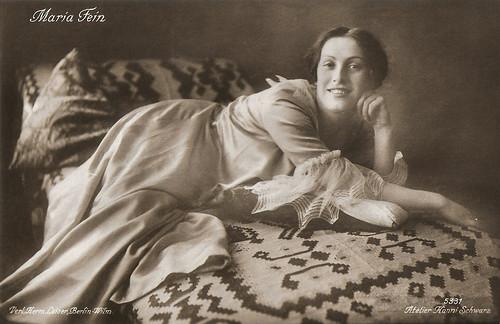
German postcard by Verlag Hermann Leiser, Berlin-Wilm., no. 5331. Photo: Atelier Hanni Schwarz. Maria Fein.
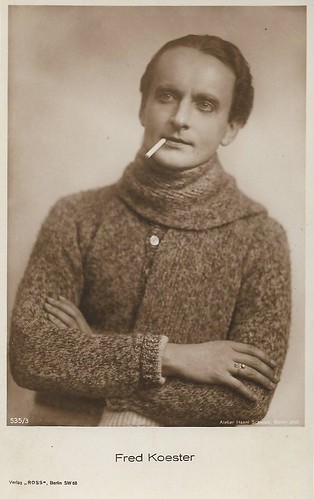
German postcard by Ross Verlag, Berlin, no. 535/3, 1919-1924. Photo: Atelier Hanni Schwarz, Berlin. Fred Köster.
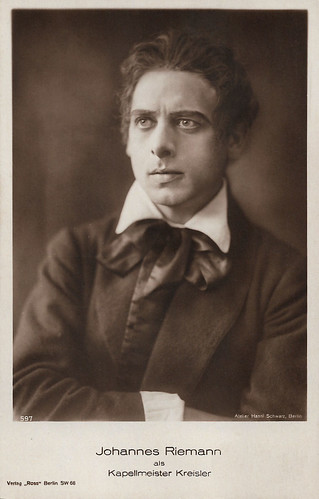
German postcard by Ross Verlag, no. 597, 1919-1924. Photo: Hanni Schwarz, Berlin. Johannes Riemann as Kapelmeister Kreisler. Kapellmeister Kreisker may refer to Tales of Hoffmann.
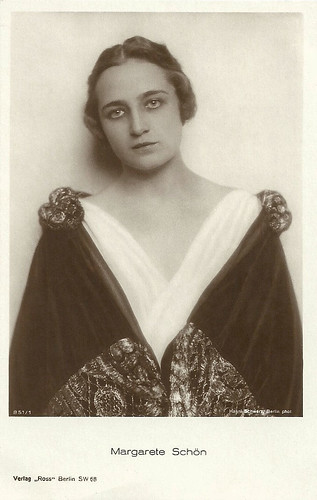
German postcard by Ross Verlag, no. 851/1, 1925-1926. Photo: Hanni Schwarz, Berlin. Margarete Schön.

German postcard by Ross Verlag, no. 1579/1, 1927-1828. Photo: Atelier Hanni Schwarz. Anton Pointner.
A so-called beauty evening
Hanni Schwarz's life dates are unknown. Before turning to photography, Schwarz worked as a teacher at her father’s school in Basel.
In 1901, Hanni began to work as a portrait photographer in Berlin. Around 1904, she took over the photography studio of Johannes Hülsen in Berlin, together with fellow photographer Anna Walter.
In 1905, Schwarz wrote an article for Photographische Mitteilungen about photography as a profession for women. In her article 'Photographie als Frauenberuf', she honoured pioneer photographer Emilie Bieber, the founder of Atelier Bieber, who had passed away in 1884.
In April 1908, a so-called beauty evening took place in the Mozartsaal of the Neues Schauspielhaus. Nude photographs by Hanni Schwarz and Wilhelm von Gloeden were presented and projected onto a screen. Around 1909, Schwarz ran her studio with Marie Luise Schmidt in the Dorotheenstraße in Berlin.
A portrait Hanni Schwarz had made of the artist Fidus appeared in a book edited by Adalbert Luntowski in 1910. In the same year, In 1910 she participated in the Brussels International 1910 with nude photographs. Colour photographs of her were shown at the 'Bugra" in 1914. Hanni Schwarz had made a name for herself in Berlin as a fine art photographer.

German postcard by Ross Verlag, no. 1897/2, 1927-1928. Photo: Hanni Schwarz, Berlin. Carl Auen.

German postcard by Ross Verlag, no. 3114/1, 1928-1929. Photo: Atelier Hanni Schwarz, Berlin. Henry Stuart.
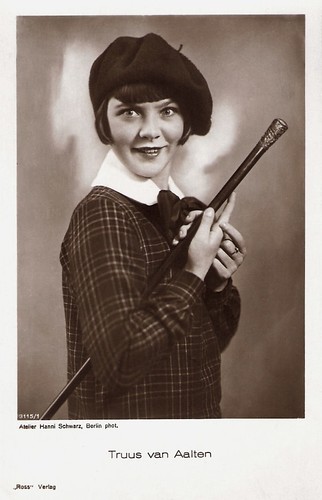
German postcard by Ross Verlag, no. 3115/1, 1928-1929. Photo: Atelier Hanni Schwarz, Berlin. Truus van Aalten.
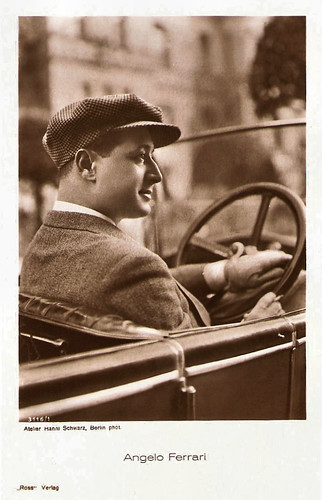
German postcard by Ross Verlag, no. 3116/1, 1928-1929. Photo Atelier Hanni Schwarz, Berlin. Angelo Ferrari.
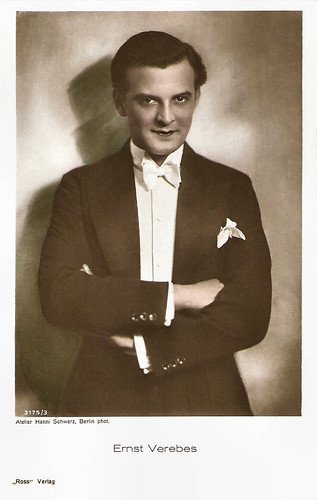
German postcard by Ross Verlag, no. 3175/3, 1928 - 1929. Photo: Atelier Hanni Schwarz, Berlin. Ernö or Ernst Verebes.
Europe’s premiere film star postcard publisher in the 1920s
From 1919 onwards, the studio at the Dortheenstrasse was listed as the Atelier Hanni Schwarz. The studio specialised in portraiture and dance photography. Photographs by Atelier Hanni Schwarz were frequently published in several popular magazines, such as Die Schönheit (from 1903 on) and Sport im Bild.
Ross-Verlag in Berlin, Europe’s premiere film star postcard publisher in the 1920s and 1930s, printed numerous portraits taken by Atelier Hanni Schwarz of famous actors, such as the Russian film actor Vladimir Gajdarov (1917-1968), Hungarian film actor Imre Ráday (1905-1983) and Dutch actress Truus van Aalten (1910-1999), who were all working in the German film industry at the time.
In the 1920s, Atelier Hanni Schwarz was managed by 'Fräulein Igoleit', who also specialised in portrait and dance photography. She had joined the company on 18 October 1919. Frida Igoleit was born on 11 October 1884 in Königsberg and the last entry about her is that of her de-registration to America on 26 March 1932.
The cancellation of the company can be dated to 13 November 1936. In a 1919 questionnaire, Igogeit describes the studio as located in a 7-room flat, consisting of 2 large workrooms, 2 studio rooms, 1 laboratory, 1 darkroom and 1 reception room. The number of employees is given as 6-8 people, 10-12 suppliers and 800-900 customers.
The most recent photographs attributable to Atelier Hanni Schwarz date from 1930, after which the studio's photos no longer appeared in magazines or on postcards. In 2000, works by Hanni Schwarz were included in the exhibition 'Le siècle du corps. Photographies 1900-2000' at the Musée de l'Elysée in Lausanne.

German postcard by Ross Verlag, no. 3194/1, 1928-1929. Photo: Hanni Schwarz, Berlin. Imre Ráday.
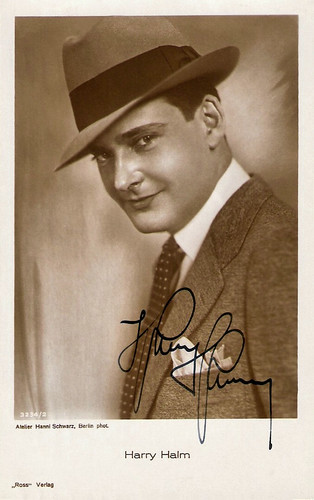
German postcard by Ross Verlag, no. 3234/2, 1928-1929. Photo: Atelier Hanni Schwarz, Berlin. Harry Halm.
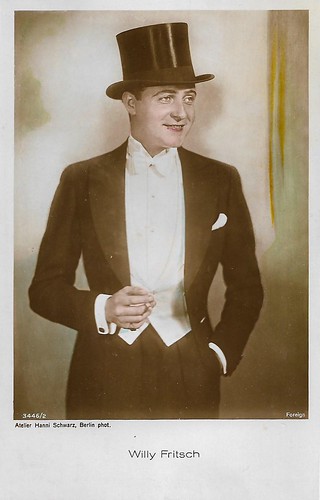
German postcard by Ross Verlag in the Foreign Series, no. 3446/2, 1928-1929. Photo: Atelier Hanni Schwarz, Berlin. Willy Fritsch.
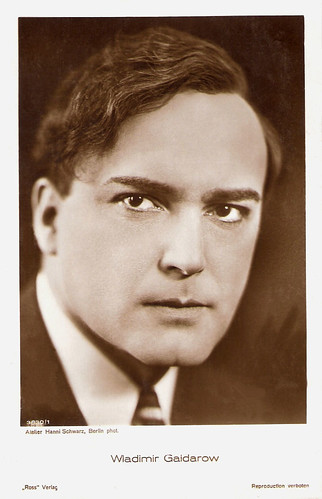
German postcard by Ross Verlag, no. 3830/1, 1928-1929. Photo: Atelier Hanni Schwarz, Berlin. Vladimir Gajdarov.

German postcard by Ross Verlag, no. 3887/1, 1928-1929. Photo: Hanni Schwarz, Berlin. Mona Maris.

German postcard by Ross Verlag, no. 4649/1, 1929-1930. Photo: Atelier Hanni Schwarz, Berlin. Franz or Francis Lederer.
Sources: Hanni Schwarz (Photografische Mitteilungen - German), Deutsche Fotothek (German), Sisters of the Lens and Wikipedia.
No comments:
Post a Comment